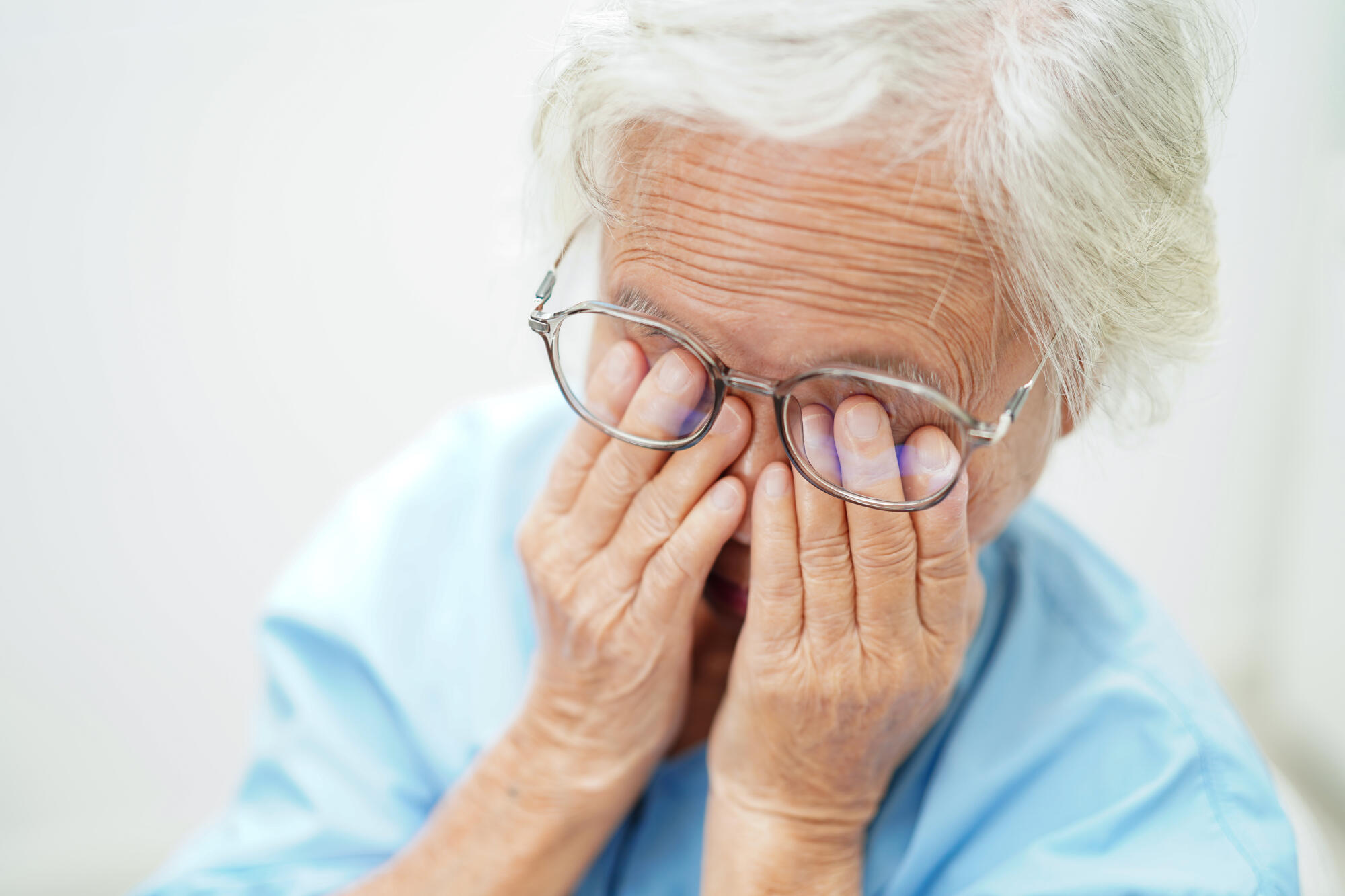
Dry Eyes at Night: Common Symptoms and Treatment

All of us have experienced dry eyes at some point in our lives. While most people’s dry eyes go away on their own, some may require additional measures to relieve their symptoms.
According to research by Ophthalmology Times, 16 million people have dry eye syndrome in the United States alone. If your dry eyes are keeping you from a good night’s sleep, we’ve got you covered. Continue reading about the most common symptoms of dry eyes at night and the treatments that will help alleviate them.
Importance of a Normal Tear Film
Every time you blink, a protective coat of tears covers your eyes. This layer of fluid is vital in preserving the health of your eyes by lubricating them and keeping the surface clean and free of harmful debris.
The tear film is made of three layers. They’re the outer lipid (prevents tear evaporation), the middle aqueous (washes away particles to infection), and the inner mucin (stabilizes the tear film).
When any part of this film becomes unstable, it can lead to inadequate tears and decreased eye lubrication. If left untreated, this could result in dry eyes and possibly cause irritation, surface damage, vision problems, and other issues.
Dry Eye Symptoms
Occasional dry eyes at night are a common experience. While mild or occasional symptoms may disappear on their own, some are more persistent and may indicate an underlying health concern. Some symptoms of dry eyes may include:
- Burning or itching
- Watery eyes
- Redness and irritation
- Sensitivity to light
- Blurry or filmy vision
- Discharge in or around the eyes
- Gritty or scratchy feeling
- Pain while wearing contacts
- Eyestrain or fatigue
- Difficulty driving at night
Causes of Dry Eyes at Night
Dry eyes can be caused by many factors, including tears that dry too quickly and poor quality and quantity of tears. From hormonal changes, lifestyle choices, and medical conditions, here are some potential causes of dry eyes at night:
Hormonal Changes
Hormone changes or imbalances due to pregnancy, menopause, and birth control pills can affect the body’s ability to make tears. Some women experience dry eyes during their monthly period, typically when estrogen and progesterone levels increase.
Medical Conditions
Chronic medical conditions such as lupus, scleroderma, thyroid disease, rheumatoid arthritis, and Sjogren’s syndrome cause changes in the body. These changes increase the likelihood of dry eyes or increased tear evaporation.
Age Factor
The amount of water secreted by the lacrimal (or tear) gland declines as we get older. This can result in decreased tear production, which can affect the eye’s ability to retain moisture. Dry eyes are more common among individuals over 50.
Nocturnal Lagophthalmos
Nocturnal lagophthalmos is the inability to close the eyelids during sleep. This can be caused by weak or damaged eyelids, scarring, facial nerve disorders, protruding eyeballs, or sedatives. As a result, people may sleep with their eyes open. This condition is also linked to poor sleep quality and prolonged outside exposure.
Medications
Dry eye is a side effect of certain medications that can alter the composition of your tear film and decrease the number of tears your eyes produce. These drugs include diuretics, antihistamines, antidepressants, and oral corticosteroids.
Poor Hydration
When your body lacks moisture, you may be more prone to dry eyes. Water is an essential component of the aqueous layer of the tear film, which lubricates the eyes and protects them from infection. When you are dehydrated, this watery layer thins and affects the functionality of the tear film.
Environmental Exposure
Any public space or temperature change has the potential to trigger or worsen dry eye syndrome. Pollutants, smoke, allergens, and wind can all cause airborne particles to become lodged in your tear film and potentially cause inflammation. Frequently using heating and cooling systems during changes in the weather or season can also cause dry itchy eyes.
Contact Lenses
Overwear or long-term use of contact lenses can lead to chronic dry eye and interfere with your sleep. Some lenses absorb water from the eye’s surface and block oxygen flow to the cornea, which makes it difficult for your eyes to produce natural tears.
Dry eyes can also be caused by the type of contacts you wear, the contact solution you use, and how well you care for your lenses.
Eye Surgeries
Inflammation can occur after refractive, laser, or cataract surgery. While this is common in the post-operative phase, some individuals experience persistent dry eye, which can result in poor tear production and quality.
Excessive Screen Use
A healthy and stable tear film keeps eyes replenished with every blink. However, staring at a digital screen device regularly or for extended periods reduces blinking frequency and increases the risk of developing eyestrain headaches and dry eye syndrome.
Nutritional Deficiencies
Insufficient or lack of nutrients can cause an imbalance of oil, water, and mucin production in the tear film and cause dry eyes. Vitamins A, B12, C, D, E, zinc, and omega-3 fatty acids can help reduce inflammation and tear evaporation.
Fibromyalgia
Fibromyalgia is a chronic condition that causes musculoskeletal pain throughout the body. Among its symptoms, some may experience dry eyes, blurred vision, eyestrain, light sensitivity, and eye twitching.
Diabetes
Dry eye syndrome is a common side effect of diabetes. High blood sugar can cause inflammation and nerve damage in the eyes and hinder the lacrimal gland’s ability to secrete tears.
Treatments for Dry Eyes
Consulting with an eye doctor and understanding the cause of your dry eyes can determine the right relief for you. Whether it’s a prescription treatment or a natural remedy, there are many options to treat your dry eye syndrome. Some options include:
- Artificial tears
- Prescription medications
- Punctal plugs
- Prescription sunglasses
- Humidifier therapy
- Reduced screen time
- Lubricating tear gels or ointments
- Proper hydration
- Warm compresses or eyelid cleansers
- Sufficient vitamin and mineral intake
- Acupuncture therapy
A Soothing Solution
Dry eyes are an irritant that can affect everyday activities and even the quality of your lifestyle. One of the first steps to alleviating dry eyes is understanding what’s causing your symptoms.
Our mission is to help identify, treat, and prevent the cause of your dry eyes at night. Together, we can discover the treatment that works best for you so you can get the relief you deserve. Visit us at Kiwi Drug today!
Related Posts


